| Srl | Item |
| 1 |
ID:
110222


|
|
|
|
|
| Publication |
2011.
|
| Summary/Abstract |
The events of the early 1930s in Vietnam left an important legacy to France's literature of enquiry and protest. Writers, essayists and journalists enquired on behalf of their audiences, and in the process developed France's littérature coloniale. By showing an interest in the colonial 'other' and identifying discrepancies between imperial ideology and colonial reality, they formed a new body of thought. This new colonial humanism arguably changed metropolitan sensibilities towards the French civilizing mission. Nevertheless, while they are critical of colonial abuses and in favour of reforms, the authors discussed in this paper do not really question the French colonial project.
|
|
|
|
|
|
|
|
|
|
|
|
|
|
|
|
| 2 |
ID:
110219
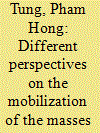

|
|
|
|
|
| Publication |
2011.
|
| Summary/Abstract |
This study re-examines participation of the masses in the revolutionary high tide of 1930-31 in Vietnam. In a departure from previous studies, it does not consider the main cause of the involvement of peasants in the protest movement to have been either the deteriorating economic circumstances of the masses or political manipulation on the part of the communists. Approaching the movement from a politico-cultural perspective, the author points to traditional factors that exerted a strong influence on the political attitude of the peasants and motivated their participation in protest movements during the colonial period. The author also uses newly unearthed historical documents to reinterpret the role of the Indochinese Communist Party in the revolutionary high tide, comparing its strategy and tactics in mobilizing the masses with those of other groups that formed part of the 'Westernized elite'. The study not only introduces new historical facts to the debate, but also presents new ways to understand the political protests of the masses in modern Vietnam.
|
|
|
|
|
|
|
|
|
|
|
|
|
|
|
|
| 3 |
ID:
110216


|
|
|
|
|
| Publication |
2011.
|
| Summary/Abstract |
Over the years, Hanoi historians have presented different views of the role of communist organizers in the events of 1930-31. Thanks to the opening of the Comintern archives, we can now see that in 1929-30 there was a strong shift in international communism towards revolutionary violence in all parts of the world. This paper discusses the ideological precedents and influences reaching Vietnam from Russia and the Comintern, as well as from the Chinese revolutionary movement. These include the slogans and political analysis of colonial countries that the Comintern and its agents were popularizing in Moscow, Paris and China. They also include the experience of peasant revolt in southern China, in particular what became known as the Hai-lufeng Soviets in Guangdong province in 1927-28, as well as Chinese left-wing politics of 1928-30, when Li Lisan was a dominant force. The author explores the idea that violent anarchism, with roots in the theories of early Russian revolutionaries, may have been a link between these disparate influences. An examination of the attitudes expressed by different Vietnamese communist leaders towards the revolutionary violence of 1930-31 forms an important part of this paper. To what extent were they in tune with the Comintern? Did they find other sources of inspiration closer to home? Were they simply riding a wave of peasant anger? In conclusion, the author discusses conceptions of what the Revolutionary High Tide represented in terms of political change in Vietnam. Was it the coming of age of the proletariat; an expression of peasant grievances that got out of control; or a first step on the path to independence?
|
|
|
|
|
|
|
|
|
|
|
|
|
|
|
|
| 4 |
ID:
110221
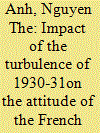

|
|
|
|
|
| Publication |
2011.
|
| Summary/Abstract |
The 1930-31 revolutionary outburst in Vietnam convinced the French administration that it needed to revitalize the local monarchy and create a living institution with initiative in decisions and reforms that would satisfy the Vietnamese people's aspirations. The Vietnamese emperor, Bao Ðai, was taken back to the imperial capital of Huê and given the task of conciliating 'the millennial traditions and disciplines of the past, indispensable to public peace, with the requirements, advances and freedoms inseparable from modern activity'. Yet this attempt to boost the monarchy's prestige was short-lived because the French administration went no further than a few measures aimed at modernizing the mandarinal machinery. The French will to mould the country's social structures into a passive state of tranquillity thus satisfied no-one, and could not help to develop a conservative ideology attractive enough to avert a revolution on the left.
|
|
|
|
|
|
|
|
|
|
|
|
|
|
|
|
| 5 |
ID:
110223
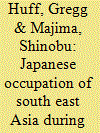

|
|
|
|
|
| Publication |
2011.
|
| Summary/Abstract |
This article reviews recent Japanese- and English-language publications to assess scholarly interchange between the two languages and the effects on South East Asia of Japan's Second World War occupation. The economic and social impact on Borneo, Malaya and Singapore of the Japanese interregnum was devastating. In Burma and Indonesia, military training given by the Japanese fundamentally shaped the post-war order. The authors find surprisingly little cross-over between those writing in Japanese or in English and argue that greater academic exchange, possibly facilitated through translation, would enhance understanding of wartime South East Asia.
|
|
|
|
|
|
|
|
|
|
|
|
|
|
|
|
| 6 |
ID:
110217
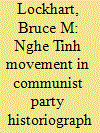

|
|
|
|
|
| Publication |
2011.
|
| Summary/Abstract |
The significance of the High Tide of 1930-31 lies not only in its impact on the evolution of the Vietnamese Revolution, but also in its status as a microcosm of policy debates and personality conflicts within the Indochinese Communist Party. This article looks at how the evolution of the Party's historiography of 1930-31 can be analysed in terms of broader political developments in Vietnam, such as struggles over ideology and the growing leadership role of Hô Chí Minh.
|
|
|
|
|
|
|
|
|
|
|
|
|
|
|
|
| 7 |
ID:
110218


|
|
|
|
|
| Publication |
2011.
|
| Summary/Abstract |
Vietnamese music history records the song 'Cùng nhau di hông binh' ['Let's Go Forward Red Army'] as having been created at the time of the Nghe Tinh Soviet and the founding of the Indochinese Communist Party. Attributed to a political prisoner, it circulated in Vietnam's prisons in the 1930s. Although the circumstances of the song's creation and creator are murky, both have been given revolutionary credentials to help solidify claims that the Communist Party guided a Vietnamese musical renaissance.
|
|
|
|
|
|
|
|
|
|
|
|
|
|
|
|
| 8 |
ID:
110220
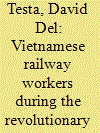

|
|
|
|
|
| Publication |
2011.
|
| Summary/Abstract |
Vietnamese railway workers at the Truòng Thi workshops in colonial Vinh, north-central Vietnam did not join the uprisings against French authority that rocked Nghê An, Hà Tinh and Quang Ngãi provinces in 1930 and 1931. Although the railway workers by then shared a common vocational identity and were unified in seeking improvement of workplace concerns, ethnic, sectarian, regional and status differences among them weakened a common political identity. The heterogeneity of railway workers' attitudes towards political alignment at the time encourages a broader re-examination of the attitudes of participants and observers in the Nghê Tinh Soviets overall.
|
|
|
|
|
|
|
|
|
|
|
|
|
|
|
|